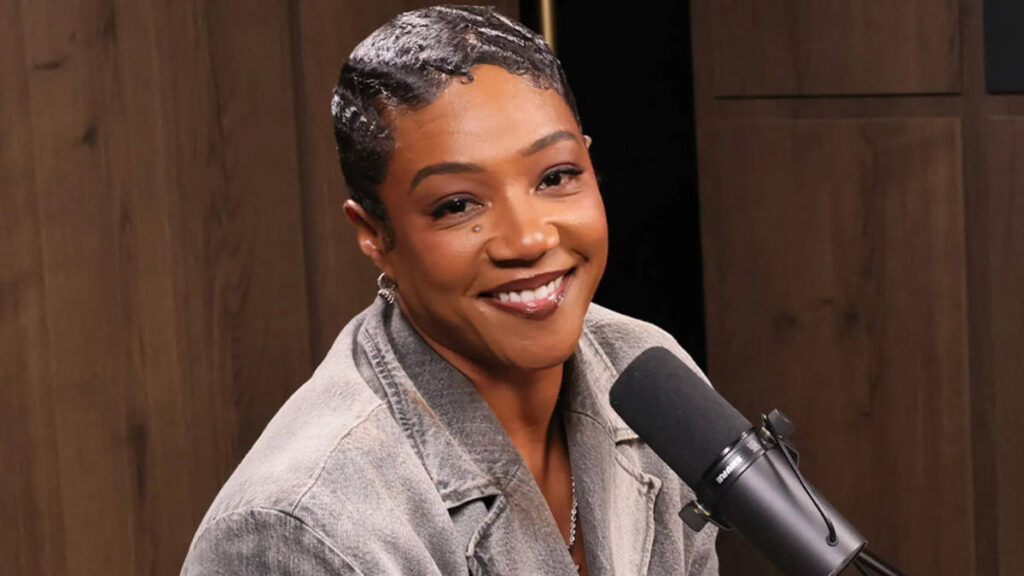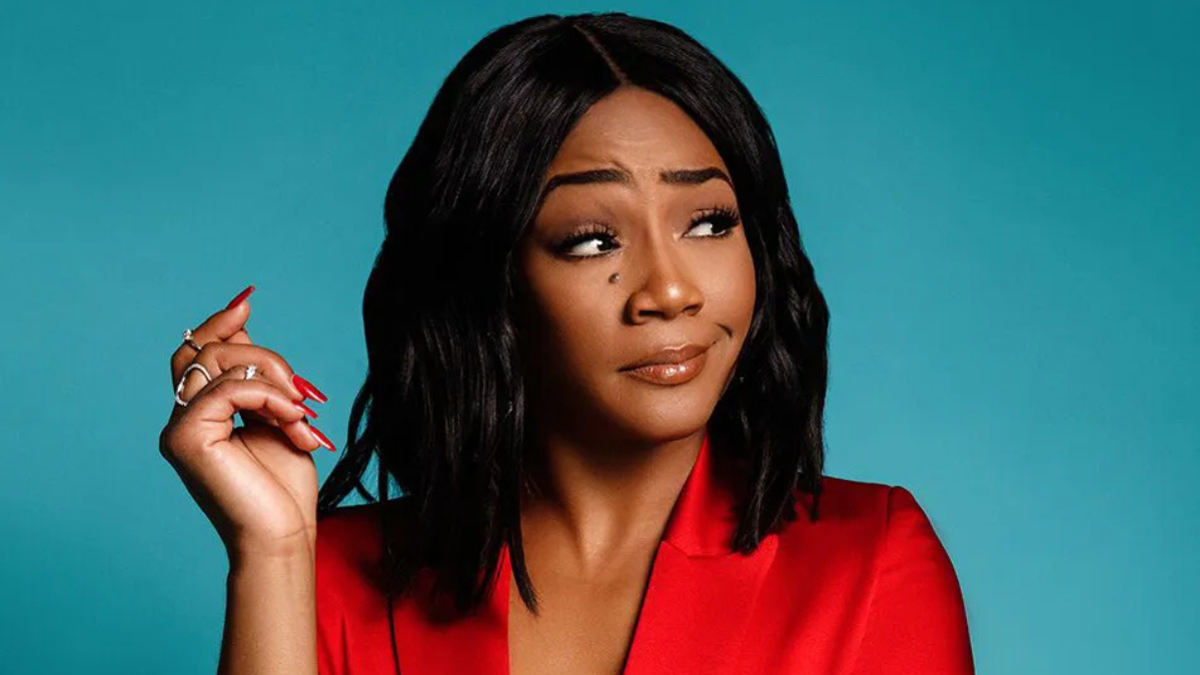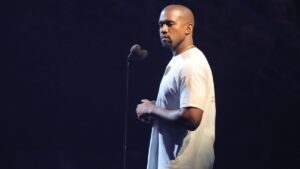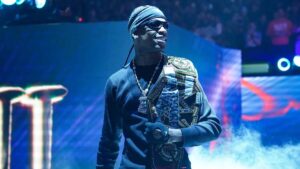It wasn’t just a grapefruit — it was a cultural reset.
When Tiffany Haddish stood in that now-iconic hotel suite scene in Girls Trip, hilariously demonstrating the art of seduction with a piece of citrus, the audience didn’t just laugh — they gasped. Here was a woman so unapologetically herself, so irreverently bold, that even Hollywood, a place built on façades, couldn’t look away. That moment wasn’t just comedy; it was rupture — a loud, raunchy, radiant warning shot that the rules had changed.
Tiffany Haddish didn’t sneak into the spotlight; she detonated into it.
And what’s remarkable is that her explosion didn’t just open doors for her — it blew open conversations about what Black women could be on screen: messy, hilarious, broken, brilliant, and most of all, real. In an industry that often rewards polish over presence, Haddish’s gift is her refusal to dim or dilute. She’s not just telling jokes — she’s telling truths in disguise, reshaping Hollywood’s idea of voice, value, and visibility.
She wasn’t just ready. She was necessary.
“She Ready” — But for What?
Tiffany Haddish didn’t grow up dreaming of stardom — she grew up surviving.
Raised in South Central Los Angeles, her childhood was defined not by opportunity but by instability. After her mother suffered a debilitating brain injury in a car accident, Haddish was thrust into the foster care system — bouncing between homes, navigating strangers’ rules, and learning quickly that laughter could disarm danger. “If I could make you laugh,” she once said, “you wouldn’t hit me.” Comedy, for her, wasn’t performance — it was protection.
That raw, reflexive humor followed her into adulthood, but breaking into stand-up was a grind. She hit open mics in dingy clubs, bombed in rooms full of hecklers, and slept in her car when the gigs didn’t pay. Her voice — too loud, too real, too much — didn’t fit into the tidy boxes Hollywood had reserved for women like her.
But she kept showing up.
One night, struggling financially and emotionally, Haddish met Kevin Hart in a parking lot. He didn’t just give her $300 to get a motel — he gave her advice: write a vision board, visualize the life you want, and go after it. It wasn’t a grand gesture, but it was a turning point.
Haddish doubled down — refining her craft, telling stories rooted in trauma and resilience, leaning into the gritty comedy that made her feel seen. She wasn’t aiming to be perfect. She was aiming to be heard.
And in that struggle — that imperfect, unapologetic grind — she carved out a voice no one could ignore. Not polished, not prim — but powerful, and unmistakably hers.
“She’s ready” wasn’t a catchphrase. It was a battle cry.
When Girls Trip Changed the Game
Tiffany Haddish didn’t just appear in Girls Trip — she hijacked the screen with such force that audiences left theaters quoting her instead of the leads. In a cast stacked with A-listers like Queen Latifah, Regina Hall, and Jada Pinkett Smith, it was Haddish — then a relative unknown — who became the film’s breakout sensation.
Her portrayal of Dina, the uninhibited, hilarious, and unpredictable friend, wasn’t just funny — it was revolutionary in its freedom. Critics compared her performance to Eddie Murphy’s in 48 Hrs and Melissa McCarthy’s in Bridesmaids — not just for the laughs, but for the way she shifted the energy of the film around her. As The New York Times put it, “Haddish doesn’t steal scenes. She owns them before anyone else gets a chance.”
The infamous grapefruit scene became instantly iconic, not just because of its outrageousness, but because it symbolized the kind of fearless femininity rarely seen — and even more rarely celebrated — in mainstream film. She was wild, raunchy, emotionally chaotic, and magnetic.
But the impact went deeper than just viral buzz. Girls Trip proved that a Black-led comedy — written by Black women, directed by Malcolm D. Lee, and centered on authentic female friendship — could dominate the box office. It made over $140 million worldwide. It also opened the door for studios to take more risks on projects that didn’t fit the usual formula.
For Haddish, it was the moment the world realized what she already knew: not only was she ready — she was unignorable. And for Hollywood, it marked a long-overdue reminder that stories — and stars — that reflect real, unfiltered life can win big.
More Than Punchlines — Building a Brand with Purpose
Tiffany Haddish may have burst onto the scene with laugh-out-loud comedy, but her real power lies in what came after the punchlines. Over the past few years, she’s evolved into a multi-hyphenate force — part memoirist, part producer, part advocate — and every move feels less like a career strategy and more like a mission statement.
Take her 2017 memoir, The Last Black Unicorn. Far from a glossy celebrity tell-all, it was raw, darkly funny, and often painful. Haddish opened up about her time in foster care, childhood abuse, and homelessness — all told with the same unflinching honesty that made her famous. It wasn’t just a book; it was a recalibration of what vulnerability in public life could look like. She didn’t share to shock. She shared to connect.
That same ethos runs through her production company, She Ready Productions, which aims to uplift underrepresented voices and give opportunities to performers who rarely get a first shot, let alone a second. She’s also partnered with organizations supporting foster youth, creating programs to provide them with job skills and emotional support.
Even in brand partnerships — notoriously surface-level territory for many celebrities — Haddish brings intention. Whether voicing animated characters or launching product collaborations, her projects often tie back to causes she cares about: mental health, literacy, and community equity.
She’s not trying to be perfect. She’s trying to be useful — to show that success doesn’t mean leaving your past behind, but bringing others with you as you rise.
For Tiffany Haddish, the joke was never the endgame. It was the beginning — the crack in the door she would pry open, not just for herself, but for every kid who was told they’d never make it past survival.
The Cultural Disruptor Hollywood Didn’t Expect
In an industry built on carefully crafted personas and polished PR, Tiffany Haddish didn’t just arrive — she disrupted. And she did it without ever asking for permission.
She’s the kind of celebrity who tells the unfiltered version of every story — even when it makes people uncomfortable. Remember the time she showed up to the Oscars wearing the same white Alexander McQueen dress for the third time? It wasn’t a fashion faux pas. It was a statement. “This dress costs more than my mortgage,” she quipped. “I’m wearing it multiple times because that’s what real people do.”
Moments like these — casual, hilarious, yet quietly defiant — are Haddish’s signature. She refuses the Hollywood pressure to repackage herself into something palatable, and in doing so, she makes space for others to do the same.
She’s spoken candidly about racism in the industry, tokenism in casting, and how Black women in comedy are still expected to contort themselves to fit someone else’s idea of “funny.” Even when it ruffled feathers — like when she called out gatekeepers for overlooking comedians of color — she never dialed it back. Her interviews aren’t soundbite-polished; they’re unpredictable, uncensored, and often illuminating.
But what’s most disruptive is that she’s not trying to “fix” herself to fit the mold. She’s forcing the mold to expand.
That’s powerful — especially in a landscape where women, and particularly Black women, are so often pressured to soften their edges. Haddish’s success says that you can be loud, vulnerable, funny, political, and still win. She’s rewriting the unwritten rules: You don’t have to play the game. You can flip the table.
In many ways, Tiffany Haddish is Hollywood’s inconvenient truth — and the industry, whether it’s ready or not, is starting to listen.
Beyond the Mic — Tiffany Haddish vs. Her Peers
Tiffany Haddish shares the comedy stage with giants — Kevin Hart’s relentless hustle, Amy Schumer’s razor-sharp satire, Issa Rae’s cerebral storytelling. Yet Haddish’s space in the cultural conversation feels entirely her own. Where others refine their edges for mainstream appeal, Haddish leads with unvarnished truth, using personal chaos as a punchline — and that’s what makes her unforgettable.
Kevin Hart, her mentor and friend, built a comedy empire on relatability and business savvy, often projecting a polished version of struggle. Amy Schumer pokes at gender politics and privilege with a wink to her audience. Issa Rae mines the nuance of Black identity through awkwardness, silence, and subtlety.
Haddish, in contrast, doesn’t hint at the hard stuff — she throws it down, laughs through it, and dares the audience to laugh with her. Her humor doesn’t just reveal vulnerability; it requires it. When she tells stories about growing up in foster care, dating disasters, or sleeping in her car between gigs, she’s not embellishing — she’s translating trauma into survival art.
She speaks most directly to those who’ve been on the margins — Black women, working-class audiences, people who’ve never seen their reality reflected in the comedy mainstream. But her appeal transcends any one group because there’s nothing performative about her presence. She’s not just funny — she’s familiar. And in an era when authenticity is currency, Tiffany Haddish is wealthy.
In the landscape of modern comedy, where personas are carefully curated, Haddish remains disruptive precisely because she isn’t curated at all. She’s lived it, she’s laughed at it — and she’s still holding the mic.
A Seat at the Table — And Setting It for Others
Tiffany Haddish isn’t just taking up space in Hollywood — she’s creating it for others, too.
Since her rise, Haddish has made it clear that her success means little if she’s the only one at the table. Through her production company, She Ready Productions, she’s actively developing projects that center on underrepresented voices — especially women and artists of color who have long been sidelined in comedy. Her company has prioritized working with emerging talent, not just onscreen but in the writers’ room, in the director’s chair, and on the production floor.
One of her most notable initiatives is the She Ready Internship Program, which connects foster youth — a community close to her heart — with opportunities in the entertainment industry. It’s not a feel-good headline. It’s hands-on, resume-building access for young people who’ve traditionally been shut out.

She’s also used her platform to amplify lesser-known comedians, regularly spotlighting Black female comics in interviews, on tour lineups, and in TV appearances. In a 2021 interview, she said, “I want to help people the way people helped me. That’s the whole point — to break the cycle of only one person making it.”
Whether it’s mentoring young writers, hiring diverse crews, or simply refusing to conform to industry molds, Haddish is laying the groundwork for a more inclusive comedy culture — one where being “too real” isn’t a liability, but a superpower.
Her legacy won’t just be about what she said on stage. It’ll be about who she stood beside — and who got the mic after she handed it over.
Watching Tiffany from the Front Row
The first time I saw Tiffany Haddish perform live, it felt less like watching a comedy set and more like being let in on a glorious secret — one I didn’t know I needed to hear.
She wasn’t polished in that celebrity way. Her hair was a little wild, her voice cracked mid-joke, and she laughed at herself just as hard as the audience did. But there was this electric clarity to her — like she wasn’t performing at us, she was talking to us. Or maybe even for us.
There was one moment — a joke about growing up hungry, sneaking extra snacks into her foster home — where the whole room went quiet. Not uncomfortable, just reverent. She wasn’t asking for pity. She was handing us her past like a well-worn punchline, and somehow making it a victory lap.
That night, I realized Haddish doesn’t just tell jokes. She alchemizes life — the ugly, the unfair, the absurd — and makes it bearable through laughter. That’s a rare kind of power. And it’s why, years later, her voice still echoes in my mind: not as a celebrity, not even as a comedian, but as someone who made truth feel not only possible — but funny.
She didn’t just own the room. She opened it up.
What’s Next for the Loudest Voice in the Room?
Tiffany Haddish has never been predictable — so it makes sense that what’s ahead for her feels more like a question mark than a clear path. But that uncertainty isn’t hesitancy. It’s an expansion.
She’s already hinted at bigger roles behind the camera — producing films, writing scripts, mentoring creatives. And while she’ll return to the spotlight with upcoming streaming projects and comedy specials, her trajectory suggests a shift: less about being seen, more about seeing others. More platform, less performance. More movement, less moment.
She’s also spoken about wanting to go deeper into activism — focusing on foster care reform, homelessness, and mental health resources, especially for marginalized youth. It’s not a pivot away from comedy but a layering of purpose over punchlines.
The loud, unfiltered Haddish will always exist — we need that voice. But there’s something sharper emerging too: strategic, intentional, rooted. She’s shaping not just characters, but systems. Not just shows, but spaces where other voices can rise.
So, what’s next? Maybe a film. Maybe a foundation. Maybe something that doesn’t exist yet — but should.
Whatever form it takes, it’s clear that Tiffany Haddish isn’t done disrupting. She’s just begun designing. And if her past has taught us anything, it’s that when she shows up, change follows.
Nishant Wagh is the founder of The Graval and a seasoned SEO and content strategist with over 15 years of experience. He writes with a focus on digital influence, authority, and long-term search visibility.





1 thought on “From Comedy Clubs to Culture Shaper: How Tiffany Haddish Is Changing Hollywood’s Voice”